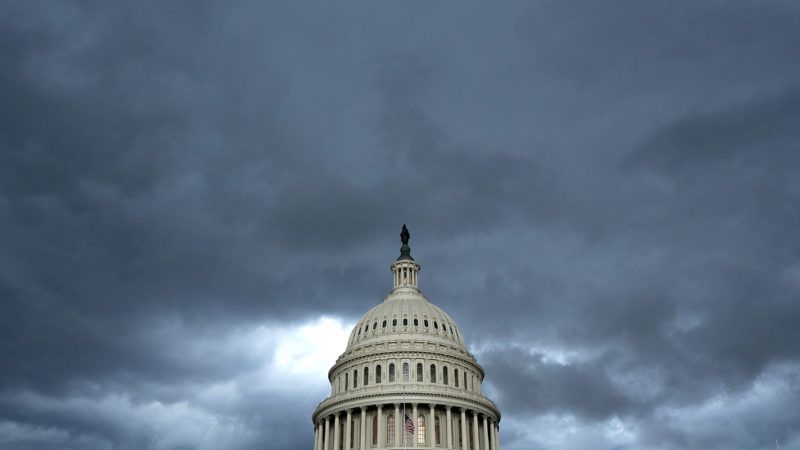Voters Wisely Chose Divided Federal Government
Anyone who was rooting for both "teams" to lose on Election Day should be fairly satisfied right now.

At some point when his bruised ego allows it, President Donald Trump will quit acting like the spurned dictator of Belarus and curtail his civically destructive effort to overturn a legitimate election. At that point, we can embrace a satisfying reality, regardless of our presidential preference: America will have a bitterly divided government that won't accomplish very much.
Being libertarian, I rarely enjoy election night. It's like watching a football game between the Patriots and the Raiders. Is it possible for both teams to lose badly? Fortunately, that result is entirely possible in our political system—and is what took place on Tuesday. Democrats had hoped for a blue-wave election that would throw Trump to the curb, provide a Senate majority and expand their numbers in the House.
They succeeded in dumping Trump by a rather impressive margin. After Trump won 306 electoral votes in 2016 and lost the popular vote by nearly 3 million ballots, his campaign adviser Kellyanne Conway called it a landslide. Joe Biden won the 2020 election with a likely 306 electoral votes and a 5 million popular-vote margin. I wouldn't call it a landslide, but it was a decisive win by modern standards.
Instead of celebrating, Democrats are eating their own, given their failure to win states including Florida and Texas, and their failures in Congress. Republicans are angry and denial about the president's loss. I find myself relishing both sides' sorrows.
Control of the Senate is pending two runoff elections in Georgia. Democrats warn that if Republicans win either of those seats, Biden won't be able to advance a bold agenda. I'm unimpressed by any of the candidates in those races, but the possibility of gridlock doesn't frighten me. I'm fine that Biden won, but don't want him to accomplish anything.
Republicans also gained a number of seats in the House of Representatives, thus leaving Democrats with the slimmest governing majority in 60 years. Many voters split their tickets—preferring an end to this norm-busting presidency without giving an imprimatur to a progressive agenda. In their collective wisdom, the nation's voters appear to have shown a surprisingly libertarian sensibility.
Biden's job will be "mission impossible," according to Washington Post columnist Ruth Marcus, and not just because of a divided Congress. "If Biden, limited in what he can accomplish legislatively, turns to regulation, he will confront a court that is reflexively hostile to the administrative state, and willing to consider extraordinary changes in law to limit its reach," she added. To Democrats that's a bad thing, but it's music to my ears.
Even California's lopsidedly Democratic voters issued a split decision. Californians continue to give Democrats legislative supermajorities. But, as I wrote last week, they shredded the Democratic leadership's priorities on statewide ballot initiatives. California remains a one-party state, but the initiative process maintains some semblance of division—an imperfect check on progressive nostrums.
For instance, voters gutted Assembly Bill 5's ban on independent contracting by approving—with incomprehensibly large margins—Proposition 22. They also solidly rejected Proposition 15, which would have ended Proposition 13's longstanding tax protections for commercial and industrial properties. They strongly opposed Proposition 21's plan to give local governments more rent-control powers.
Democratic primary voters smacked down the party's progressive wing this year when Bernie Sanders' candidacy hit the rocks. Biden is a liberal Democrat, but not a particularly activist one. He might actually do better with a GOP Senate because he could tell his party's base, "I'd love to nationalize health care, regulate the Internet and pass a Green New Deal, but those dastardly Republicans won't let me." He'll settle for minor legislative tweaks.
Some of my conservative friends have argued that libertarians should have jumped on the Trump bandwagon to stop the progressive onslaught. But Republicans support tariffs (which are huge taxes and regulations on business), heavy-handed immigration policies, boosts in military and intelligence spending, and they oppose limits on police powers. At least now, the GOP will rediscover its opposition to executive orders and debt spending.
In the ideal libertarian world, it shouldn't matter which party is in control of the government because its power would be so limited that government leaders wouldn't be able to make much mischief. We shouldn't even have to care who happens to be the president. (When Democrat Grover Cleveland was president, he mainly gave speeches and vetoed bills—and spent time greeting members of the public on his goodwill tour and at the White House.)
In an authoritarian state, the people pay heed to everything the Dear Leader utters. Consider that as you hang on every tweet from the president—or wait for the governor's daily edicts about which businesses may be open today. I'm not sure what we can do about our current predicament, but the best idea—from an election perspective—is to keep our governments as politically divided as possible.
This column was first published in The Orange County Register.
